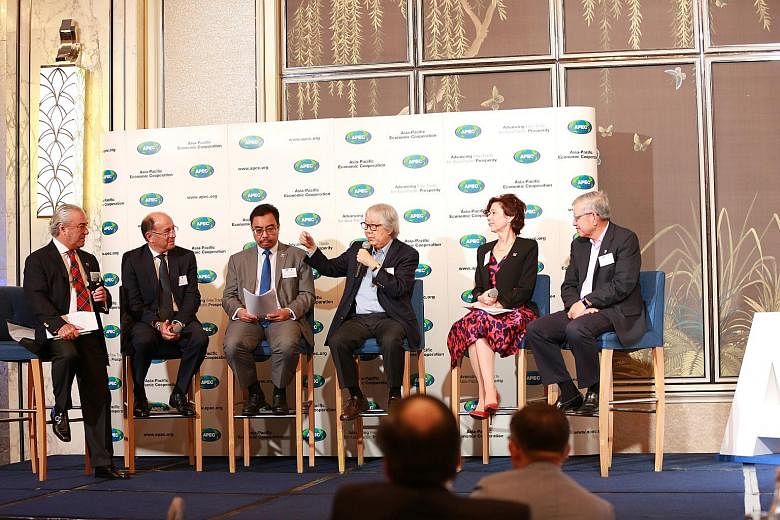The Asia-Pacific Economic Cooperation (Apec) forum has to be inclusive and open in order to move forward, said ambassadors and business experts on a panel yesterday.
They noted that while much progress has been made since the body was formed 30 years ago, priorities must now focus on social issues and climate change, especially amid economic slowdown, protectionism and technological disruption.
The theme was set by Mr Mathias Francke, the chair of Apec senior officials this year, who told the event at the Shangri-La hotel to mark Apec's 30th anniversary that inclusive growth is important.
This means increasing the participation of women and small and medium-sized enterprises (SMEs) in regional trade.
SMEs employ over half the workforce in Apec but account for less than 35 per cent of direct exports.
Apec was formed in 1989 and includes 21 economies across the region, which is home to around 2.9 billion people and represents about 60 per cent of the world's gross domestic product (GDP).
Initiatives this year will help to simplify regulations, allowing SMEs greater access to the global marketplace and strengthening their capability to benefit from digital trade.
The panel agreed that inclusiveness is vital to the body's progress.
It consisted of Dr Pablo Lizana Allende, president of the Latin American Chamber of Commerce; Mr Hairil Yahri Yaacob, deputy secretary-general of the Ministry of International Trade and Industry in Malaysia; New Zealand High Commissioner Jo Tyndall; Ambassador-at-Large Tommy Koh, who is also chairman of the Centre for International Law; and Mr Ho Meng Kit, chief executive of the Singapore Business Federation.
It was moderated by Ambassador of Chile in Singapore James Sinclair.
Ms Tyndall told the panel that it is important to address issues that cause inequality or they will have an impact on the economy.
Professor Koh also noted: "We need to ensure prosperity is shared more equally and filters down to the grassroots, so Apec is seen as an important institution (for all).
"It cannot be seen as an elite organisation that just benefits big businesses."
He said that there are angry voters worldwide who feel they have not benefited from policies such as free trade, adding: "We don't want such right-wing populism to take root here."
Shining a spotlight on such social issues is especially vital, given technological disruption, Prof Koh said.
"With technology comes rising inequality between countries too... There is an impact on retail businesses, especially small ones.
"Robotics and artificial intelligence can deprive workers of jobs in manufacturing. Technology can also cause workers to lose jobs in the banking industry.
"It is incumbent on us to ensure people who are displaced... can be reskilled and find new jobs."
If harnessed properly, there is much potential for the digital economy to transform the region and society, said Mr Ho.
"In the next 30 years, technology will change the world - it will help inclusiveness, climate change and to combat hunger.
"But Apec has to ensure this is so, through e-commerce rules, for instance. There can be greater digital inclusion for women and small businesses but we must harness technology (for it)."
Mr Ho added that it is vital for leaders to keep trade flows open, amid trade tensions and a slowing economy, as reflected in Singapore's lowered GDP forecast.
"Singapore... is like a canary in a mine shaft... We are the first to slow down because of tensions.
"It sends a warning to all other Apec economies that are hugely export-dependent.
"Countries have benefited from open markets and we must keep open multilateral rules...
"We need to keep open markets and resist protectionism."


